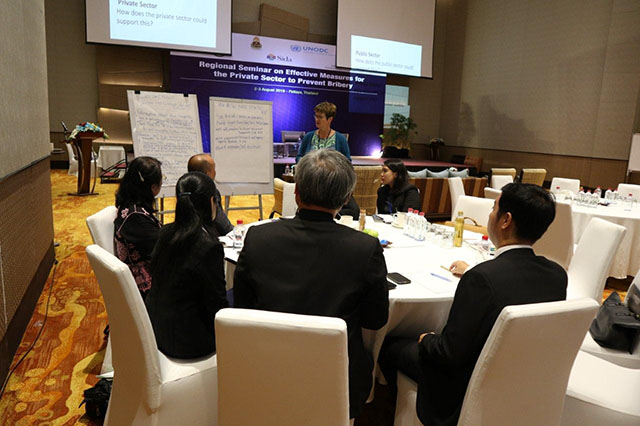Combatting Corruption in the Private Sector – Regional and Myanmar Developments

Vicky Bowman, MCRB Director, attended a Regional Seminar on Effective Measures for the Private Sector to Prevent Bribery in Pattaya on 2-3 August 2018, organised by the UNODC with the assistance of the Thai National Anti-Corruption Commission (NACC).
It brought together around 150 policymakers and practitioners from legislative bodies, anti-corruption agencies and the private sector from across the Southeast Asian region and beyond, including from Myanmar's Anti-Corruption Commission.
The aim of the seminar was to discuss the latest global and regional trends on liability of legal persons and corporate responsibility as related to foreign and domestic bribery, and to:
-
Increase understanding of anti-bribery laws, measures and enforcement in Southeast Asia as well as international standards;
-
Strengthen dialogue between government and private sector on development, best practices, challenges and possible solutions which will contribute to legislative development to combat bribery;
-
Promote corporate governance and encourage the establishment of effective anti-bribery programme for legal persons in line with international standards.
The United Nations Convention against Corruption, which entered into force for Myanmar in January 2013, provides for an effective legal and institutional framework to hold legal entities accountable for corruption offences, build systems for corruption prevention in the private sector, and develop public-private partnerships and collective action initiatives for corruption prevention in the private sector. In this regard, criminal, civil or administrative liability of legal persons (i.e. companies etc) for corruption offences and establishment of foreign bribery are key requirements of the Convention. To date these are lacking in Myanmar, and in some other countries in the ASEAN region.
The conference was timely as Myanmar has recently adopted the 4th amendment to the 2013 Anti-Corruption Law. This provides enlarges the Duties of the ACC and includes a new power (Article 16p) to issue an Order or Notification to private sector companies concerning the establishment of effective codes of conduct to prevent corruption.
During the conference, the Thai NACC shared their 2017 Guidelines to companies on appropriate control measures. These include eight principles for effective controls including the need for ‘tone from the top’, risk assessment of the company’s main exposures to bribery, specific controls for high risk areas and for business partners, accurate accounts, human resources management, reporting mechanisms - i.e. internal ‘whistleblowing’ - and review of effectiveness of the company’s systems.
Anti-corruption authorities from Korea, Indonesia and Singapore also shared recent developments in their countries’ fight against corruption. From the business perspective, the Thai Chamber of Commerce and Thai Institute of Directors gave examples of the collective actions they had taken to reduce corruption, including the Coalition Against Corruption.
Following the 4th Amendment to the Myanmar Anti-Corruption law, the ACC has engaged with business, including through the establishment of a Joint Declaration with the Union of Myanmar Federation of Chambers of Commerce and Industry (UMFCCI) on 3 July, and engagement with specific sectors. This dialogue is expected to inform the adoption under Article 16(p) of the ACC’s Notification on codes of conduct and control measures for companies.
Updated February 2019
The Directorate of Investment and Companies Administration (DICA) issued an announcement concerning companies and anti-corruption on 3 August2018 which raised a number of questions for companies concerning compliance. Following business feedback, on 19 October 2018 the Anti-Corruption Commission issued Notification 14/2018 (see bilingual version) which lays down ‘Fundamental principles for businesses to develop a strong code of ethics and establish appropriate internal control measures to prevent corruption’. These are similar to the eight principles adopted by the Thai NACC.
Subsequently on 16 January 2019, DICA issued an Announcement which refers companies to the need to follow ACC Notification 14/2018. This appears implicitly to replace the earlier DICA Announcement of 3 August 2018.
These compliance requirements should also be read in the context of the rules (MM and EN unofficial translation) from the President’s Office in April 2016 concerning restrictions on gifts to Myanmar government officials.
Read also
- Handbook on Business Integrity for Myanmar Businesses
- ‘Tone from the Top’ is Essential in Combatting Corruption
- Anti-Corruption Scores Have Improved Under the NLD Government
- Workshop on Building Business Integrity Co-Hosted by MCRB and UNODC
- Good Governance Toolkit for Myanmar Businesses: A Handbook for Resisting Corruption and Working with Integrity
 English
English မြန်မာ
မြန်မာ မြန်မာ (unicode)
မြန်မာ (unicode)










